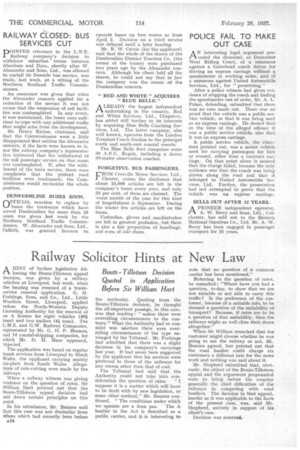Railway Solicitor Hints at New Law
Page 60

If you've noticed an error in this article please click here to report it so we can fix it.
Bouts Tillotson Decision Quoted in Application Before Sir William Hart
rl.A HINT of ' further legislation following the Bouts-Tillotson appeal decision, was given by a railway solicitor at Liverpool, last week, when the hearing was resumed of a trunk-iervice renewal application. G. H. Forkings, Sons, and Co., Ltd., Little Woolton Street, Liverpool, applied before the North-Western Deputy Licensing Authority for the renewal of en A. licence for eight vehicles (461 tons) and two trailers (41 tons). The L.M.S. and G.),17. Railway Companies, represented by Mr. G.. H. P. Beames, end 14 coastal-shipping companies, for which Mr. D. H. Mace appeared, objected.
The application was based on regular trunk services from Liverpool to South Wales, the applicant carrying mainly tin-plate from South Wales. Allega.Lions of rate-cutting were made by the railways.
When a railway witness was giving vidence on the question of .rates, Sir William Hart pointed out that the Bouts-Tillotson appeal decision had Laid down certain principles on this point.
In his submission, Mr. Beanies said that this case was not dissimilar from others which had recently been before A34 the Authority. Quoting from the Bouts-Tillotson decision, he thought the all-important passage, in this case, was that reading : " emless there were overriding circumstances to the contrary." What the Authority had to consider was whether there were overriding circumstances of the type envisaged by the Tribunal. Mr. Forkings had admitted that there was a slight decrease in his company's carryings last year. It had never been suggested by the applicant that his services were preferred to those of the railways for any reason other than that of cost.
The Tribunal had said that the Authority could not take into con
sideration the question of rates. " I suppose it is a matter which will have to be dealt with by new legislation, or some other method," Mr. Beames continued. " The conditions under which we operate are a faux pas. The A haulier in the Act is described as a public carrier, and it is interesting to
note that no question of a common carrier has been mentioned."
Referring to the question of rates, he remarked : "Where have you had a question, to-day, to show that we are not suitable or not able to carry this traffic? Is the preference of the customer, because of a suitable rate, to be deemed a question of the suitability of transport? Because, if rates are to be a question of that suitability, then the railways might as well close their doors altogether."
When Sir William remarked that the customer might choose whether he was going to use the railway or not, Mr. Beames agreed, but pointed out that the road haulier could charge six customers a different rate for the same work and nothing was said about it.
Mr. Shepherd submitted that, obviously, the object of the Bouts-Tillotson appeal and the arguments propounded were to bring before the country generally the chief difficulties of the railways in competing with road hauliers. The decision in that appeal, insofar as it was applicable to the facts of the present case, was, said Mr. Shepherd, entirely in support of his client's case.
Decision was reserved.




























































































